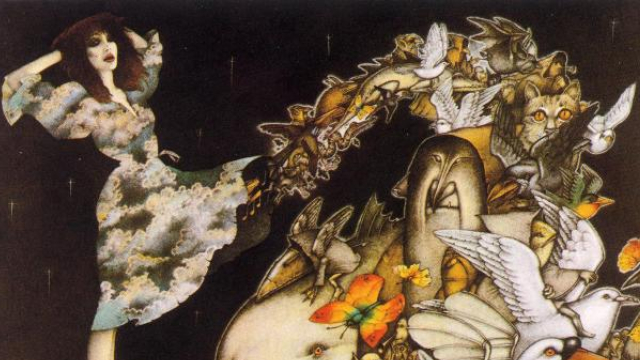Beyond the enjoyable tracks found on Lionheart, the biggest positive that came from the album was Kate Bush’s decision to take more control of the production process of her albums. Such was that commitment and indifference to the format of “album then live tour” that she stopped traditionally touring after Lionheart for 35 years (was seven seconds off those comeback tickets. Seven seconds!)
With that extra focus came new production decisions, and the main one of those (aside from a more fixed set of studio musicians) was the inclusion of new instruments. Forever the worldly and Renaissance woman, Bush brought in things as varied as the sitar and balalaika, both of which played by her brother (certainly runs in the family). But the most noticeable inclusion were the electronic: the synth; the odd drum machine and the newer technology of sampling, the first full album to contain the famous Fairlight CMI which would be used to such effect by artists like Peter Gabriel. The result was Never for Ever, an album that marks both a shift and a continuation of the Kate Bush we know. Also resulted was the first female-penned album to hit the UK Number One. Certainly a woman of firsts.
Those new instruments can be found in many places on this album, but not enough to ever become gratuitous. When the glasses smashing climax in “Babooshka” moves into the Sitar-led “Delius”, we get a representation of being through the looking glass about as great as Never for Ever’s amazing album cover (Incidentally, novelist David Mitchell is a fan of Kate Bush. I wonder if “Delius” in anyway influenced the amanuensis section of Cloud Atlas). That inventiveness is everywhere throughout this album: From the merging of bird chirping and synth chirpings in “All We Ever Look For;” the Arabic arrangements of “Egypt;” “Night Scented Stock’s” manipulation and layering of Kate’s voice being one of the best transitional materials on an album, and the apocalyptic interlude of “Breathing”, which although indebted to the prog-rock pioneers who nurtured has enough uniqueness to stand out (more on that later).
Enhanced even more than the music of this album, is Kate Bush storytelling details. Her love of character’s and theatre shows itself from the very first song “Babooshka,” home to one my most watched music videos, and the story of woman taking a secret identity to test her husband and her marriage, perhaps resulting in the opposite results she wanted. It is essentially a more sophisticated and less lame version of “The Pina Colada” song, with the cries of “Babooshka” being just nonsensical enough for any generation to sing along, but close enough to a semblance of reality to have interpretations (Babushka Doll anyone?).
That storytelling carries itself throughout the entire album, and proves itself to be both stronger and more varied than even The Kick Inside. Take for example one of Kate Bush’s most overlooked songs, “The Wedding List,” inspired by Truffaut’s The Bride Wore Black and has some flavours of “Maxwell’s Silver Hammer” on occasion (Here’s a great, rare, live version of the song). There is also the climatic track “Breathing,” told from the point of view a foetus afraid to enter the outside world due to the nuclear wasteland outside; a start that also functions as an end, thus making a great final track. Even if you could argue certain rock peers were covering similarly surreal topics and approaches, the utter uniqueness that Kate brings is the feminine and fertile approach she brings to those subject matters. All of the songs I have mentioned are not just enhanced by a female perspective; you can barely imagine it being told another way.
Then there is the distraught mum of “Army Dreamers.” It can sometimes be easy to labour on the technical aspect of music as a demonstration of some kind of authority or to approach a joint critical objectivity. I am guilty of this and make no concession to change. But I find it hard to do with this song; I just think it is perfect. Kate’s mournful voice, the samples of male soldiers that come and go, the music that, “B.F.P.O” aside, could be about any war. I had not listened to this album for a few years, and when this song came on, with its timeless waltz to the lost souls of combat, emotional without tripping in some common sentimentality, my only response was to cry. Thank goodness I was in my room, it could have been embarrassing.
To attempt a return to some kind of critical faculty, I wouldn’t call this a completely flawless album. The really interesting instrumentation of Egypt paradoxically contains some of the basest lyrics on the album. And “Violin”, whilst proving Kate Bush could rock as hard as many a peer (a few power chords short of power metal), it doesn’t really in with the tone most of Never for Ever is going for, and certainly isn’t as ambitious in terms of subject matter.
But regardless, Never for Ever is the summation of Kate Bush as a singular and constantly experimental entity in the world of music. A unique character that makes unique characters, this record is ambitious, surreal and maintains that combination of the theatrical and the tender. But that still wasn’t enough for Kate. She wanted to see how far she could push her style, and this would result in an album that would alienate some followers in the process, and that I love to pieces…
What did you think though?
Kate Bush Album Rankings
- Never for Ever
- The Kick Inside
- Lionheart

